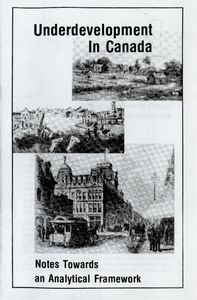

|
|

Underdevelopment in Canada
http://www.connexions.org/CxArchive/UnderdevelopmentinCanada/UnderdevelopmentInCanada.htmlPublisher: Development Education Centre, Canada Year Published: 1977 Pages: 22pp Resource Type: Pamphlet Cx Number: CX285 A collection of articles analyzing underdevelopment in Canada in historical and economic terms. Abstract: This collection of articles was gathered to look at the subject of underdevelopment in Canada. It takes an analytical approach to the issue in primarily historical and economic terms. The colonization of Canada is introduced in the context of global European expansion in search of raw materials for new trade. This began the export of unprocessed goods from Canada: fur, timber, wheat and oil to external metropoles whose own internal politics began to determine economic and political life for Canada. The shift in production from one staple to another reflects changes in the structure of demands of these various metropoles and, as a result, the determination of social structures and attitudes in hinter-land regions such as Canada. Canada's own development is viewed in parallel terms -- in other words, the planning of Canadian regions from metropole centres: Quebec, Montreal, Ottawa, Toronto -- with financial and industrial groups deciding the economic future of Canada through the C.P.R. and confederation. The effects on indigenous peoples, immigrant patterns, regional fragmentations are all reviewed in this context. The booklet studies Canada's current metropole relationship vis-a-vis the United States and other foreign countries. Present economic development is presented as now being determined by a small corporate elite who continue the process of colonization -- except now, in allegiance to their corporate lords rather than national heritage. Canada's present position internationally is seen as unique in that it is neither a central or peripheral capitalist country but instead has the qualities of both. On the one hand it enjoys a high standard of living but on the other it depends on foreign capital and technology to maintain this. This is the reason why Canada is judged a neo-colony of the U.S. and a neo-colonizer, the latter because of Canadian investments in the Third World. The paper concludes by suggesting that a self-generating mode of development would best counter regional disparities and the capitalistic-metropole style of development. This, it shows, can only be done through a restructuring of political and economic ties along with class relations. It recommends continued economic and political analysis of domestic and foreign policy, trade patterns, military strategy, and increasing public consciousness about these structures. Subject Headings |